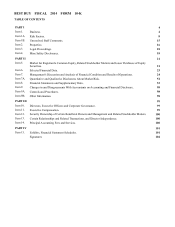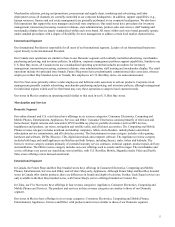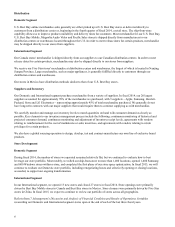Best Buy 2014 Annual Report Download - page 18
Download and view the complete annual report
Please find page 18 of the 2014 Best Buy annual report below. You can navigate through the pages in the report by either clicking on the pages listed below, or by using the keyword search tool below to find specific information within the annual report.13
Defending against lawsuits and other proceedings may involve significant expense and divert management's attention and
resources from other matters.
Changes to the National Labor Relations Act or other labor-related statutes or regulations could have an adverse impact
on our costs and impair the viability of our operating model.
The National Labor Relations Board (“NLRB”) continually considers changes to labor regulations, many of which could
significantly impact the nature of labor relations in the U.S. and how union organizing and union elections are conducted. The
NLRB has stated it intends to attempt to make union organizing easier. The U.S. Department of Labor is considering new
regulations requiring companies to publicly report the use and associated expense of external resources providing labor
relations guidance and advice. As of February 1, 2014, none of our U.S. operations had employees represented by labor unions
or working under collective bargaining agreements. Changes in labor-related statutes or regulations could increase the
percentage of elections won by unions. If any segment of Best Buy’s operations became unionized, it could increase our costs
of doing business and adversely affect our operations.
Additional legislation or regulatory activity could have a material adverse impact on our costs or disrupt our
operations.
Environmental legislation or other regulatory changes could impose unexpected costs or impact us more directly than other
companies due to our operations as a global retailer. Specifically, environmental legislation or international agreements
affecting energy, carbon emissions, electronics recycling and water or product materials are continually being explored by
governing bodies. Increasing energy and fuel costs, supply chain disruptions and other potential risks to our business, as well as
any significant rulemaking or passage of any such legislation, could materially increase the cost to transport our goods and
materially adversely affect our results of operations. New regulations governing consumer privacy and security, whether
imposed as a result of increased cyber security risks or otherwise, could materially increase our compliance costs. Regulatory
activity focused on the retail industry has increased in recent years, increasing the risk of fines and additional operational costs
associated with compliance.
Economic, regulatory and other developments could adversely affect the profitability of our credit card arrangements
and our promotional financing offerings and therefore our operating results.
We offer promotional financing through credit cards issued by a third-party bank that manages and directly extends credit to
our customers. The cardholders can receive low- or no-interest promotional financing on qualifying purchases. Promotional
financing credit card sales account for approximately 19% of our revenue in fiscal 2014. We view these arrangements as a way
to generate incremental sales of products and services from customers who prefer the financing terms to other available forms
of payment, and incremental income from the payments received from our banking partners. The profitability of our new credit
card arrangement is more dependent on the performance of our credit card portfolio than our previous arrangement. Regulatory,
legislative or economic factors could adversely affect the performance of the portfolio, and this may have a material adverse
effect on our revenues and profitability.
In addition, continuing changes in the economic and regulatory environment in the banking industry may lead banks to re-
evaluate their strategies, practices and terms, including, but not limited to, the extent to which consumer credit is granted and
the strategic focus on the retail partner credit card business. Promotional financing volumes could be materially adversely
affected in response to substantial changes to our credit card program, such as substantial modifications to the terms and
provisions of the program, or substantial adjustments to approval rates or the types of financing offered to our customers.
Our international activities subject us to risks associated with the legislative, judicial, regulatory, political, accounting
and economic factors specific to the countries or regions in which we operate.
We have a presence in various foreign countries, including Bermuda, Canada, China, Germany, Hong Kong, Japan,
Luxembourg, Mexico, the Republic of Mauritius, the Netherlands, Taiwan, Turks and Caicos, and the U.K. During fiscal 2014,
our International segment's operations generated 16% of our revenue. Our future operating results in these countries and in
other countries or regions throughout the world where we may operate in the future could be materially adversely affected by a
variety of factors, many of which are beyond our control, including political conditions, economic conditions, legal and
regulatory constraints, foreign trade rules and monetary and fiscal policies (both of the U.S. and of other countries). In addition,
foreign currency exchange rates and fluctuations may have an impact on our future revenues, earnings and cash flows from
International operations, and could materially adversely affect our reported financial performance.
























